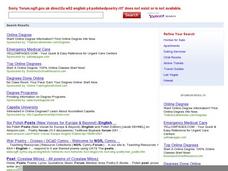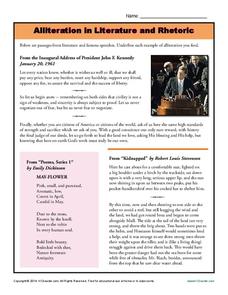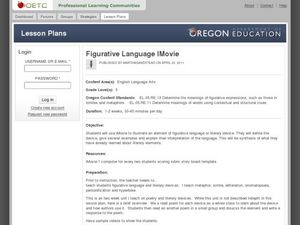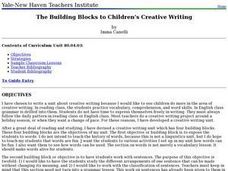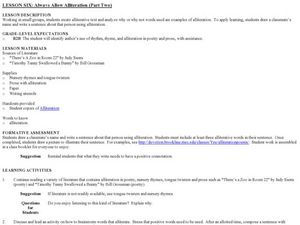Curated OER
Polished Poetry: Strange Zoo
Fourth graders use an online word list editor and software to create opening lines for a poem. They select and edit these into a complete, polished poem about an animal. They investigate parts of speech and alliteration.
National Endowment for the Humanities
The Beauty of Anglo-Saxon Poetry: A Prelude to Beowulf
Riddle me this! What do kennings, caesura, and alliteration have to do with the Nowell Codex? Introduce class members to Anglo-Saxon poetry and prepare readers for a study of Beowulf with a series of activities that includes asking...
Soft Schools
Practice Reading Poetry
Identify the rhyme scheme in a worksheet that features "Mary Had a Little Lamb." Readers use the nursery rhyme to reinforce poetic elements in four comprehension questions.
K12 Reader
Alliteration: It’s a Zany Zoo!
Elephants eat and cheetahs chase in this zany zoo! Kids survey a list of ten animals before adding in an adjective and verb for each to form an alliterative phrase or sentence.
Curated OER
Use Digital Photos of Scary Things to Inspire Poetry Writing
There's nothing like a provocative image to inspire a creative writing session. In the language arts activity presented here, middle schoolers bring in digital photos of scary objects, such as a big spider, or a hornet's nest. The...
Houghton Mifflin Harcourt
Walt Whitman: From Song of Myself
Looking for a resource that models how to read and analyze a poem? Check out this packet that uses sections of Walt Whitman's "Song of Myself" to demonstrate how to paraphrase, note literary elements, and identify the poet's inferences.
K12 Reader
Alliteration in Literature and Rhetoric
Middle schoolers are asked to identify the alliteration used in John F. Kennedy's Inaugural Address, Emily Dickinson's "May-Flower," and a passage from Robert Lewis Stevenson's Kidnapped.
Curated OER
Camels Theme Unit
In this Camel themed worksheet, learners create an alliteration, an acrostic poem, and work with similes. The unit consist of three pages of language arts work, based on Camels.
Curated OER
Figurative Language iMovie
In order to understand figurative language, learners read 5 poems, each exemplifying a different literary device. They discuss and write responses to each poem. They then choose one literary device which they will use as the basis for a...
Curated OER
Creative Writing: Children's Building Blocks
Your class can participate in a writing program involving four building blocks. By exploring words, sentences, writing forms, and story organization, they improve their creative writing skills throughout this year-long unit. Early in the...
Curated OER
Edward Lear, Limericks, and Nonsense
Introduce your class to the delights of nonsense poetry and explore literary devices with the writing of Edward Lear. Learners identify rhyme and meter as well as figures of speech, alliteration, and onomatopoeia in "The Owl and the...
Reed Novel Studies
The Voyage Of The Dawn Treader: Novel Study
A painting is worth a thousand words—in a different world! Lucy and Edmund sail away into Narnia using a picture of a ship at sea. The story tells of their adventures and the islands they visit. Scholars work through activities about the...
Poetry Internation Volume 17, 2011
Alliteration, Consonance, and Assonance in Poetry
Three poems, “Under the Mangoes” by Jacqueline Bishop, Eleanor Wilner’s “What It Hinges On,” and Robert Frost’s “Stopping by Woods on a Snowy Evening,” provide the text for an examination of alliteration, consonance, and assonance. After...
Loudoun County Public Schools
Figurative Language Packet
A definitive resource for your figurative language unit includes several worksheets and activities to reinforce writing skills. It addresses poetic elements such as simile and metaphor, personification, hyperbole, and idioms, and...
Curated OER
Found Poetry with Primary Sources: The Great Depression
Students read a sample found poem and create one together as a class. In this Great Depression lesson, students select a topic, such as miners, and read primary source documents related to the topic. Students select one narrative as the...
Curated OER
Poetry Power
Second graders explore language arts by analyzing poems in their class. In this word play lesson, 2nd graders define the terms rhyme, rhythm and alliteration and identify their uses. Students utilize class word lists to write their own...
Curated OER
Forms of Poetry
Students identify distinguishing features of poetry. They identify and use literary terminology including symbol, theme, simile, and alliteration. They recognize the effects of language.
Curated OER
Lesson Six: Always Allow Alliteration (Part Two)
Second graders practice alliteration. In this alliteration lesson, 2nd graders listen to poetry that has alliteration in it and discuss what they hear. They create their own alliterations in small groups.
Curated OER
Quirky Quatrain Poetry Lesson
Middle schoolers discover what a quatrain is, and are taught the three poetic devices: alliteration, hyperbole, and onomatopoeia. Everyone chooses a favorite hobby or activity, then attempts to write a poem about it. They must write two...
K12 Reader
Figurative Language: Edgar Allan Poe’s “The Bells”
Bells, bells, bells abound in a worksheet designed for Edgar Allan Poe's famous poem "The Bells." Middle schoolers are asked to identify the various poetic devices Poe employs.
Curated OER
Figurative Language Project
Want a handy way to remember the difference between metaphors and similes, or allusions and alliteration? Individuals craft their own figurative language booklet, complete with definitions, examples, and illustrations, following...
Penguin Books
A Teacher's Guide to the Signet Classic Edition of Beowulf
Beowulf, the Old English epic hero, comes alive again in the activities found in a teacher's guide designed to accompany a reading of the classic poem.
Santa Ana Unified School District
Early American Poets
The poems of Walt Whitman and Emily Dickinson are the focus of a unit that asks readers to consider how an artist's life and changes in society influences his or her work. After careful study of Whitman's and Dickinson's perspectives on...
Reed Novel Studies
Beezus and Ramona Novel Study
What are some of the advantages and disadvantages of having siblings? Pupils explore this topic with the Beezus and Ramona novel study. Additionally, scholars answer questions about chapter one of the time-honored book by Beverly Cleary...


